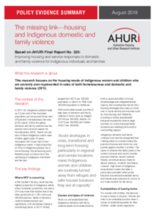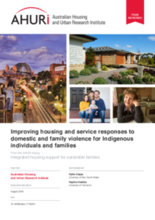Domestic and family violence is the largest driver of homelessness for women and children in Australia. Over the past decade Australian governments have invested in significant legislative, policy and service reforms to mitigate the impact of domestic and family violence for women and children. Little, however, is known as to the impact of these reforms on Aboriginal individuals and their families and their relationship to housing. This research therefore examines how housing and other service responses need to be improved to meet the needs of Aboriginal individuals and families in the aftermath of domestic and family violence. It draws on data from a rapid evidence and policy review; as well as qualitative interviews with nine Indigenous women service-users and 30 stakeholders including policy makers and service providers, in two regional cities in New South Wales and the Northern Territory.
According to the research, the unintended consequences of limited housing pathways puts Indigenous women at significant risk of having their children removed by Child Protection. Reunification is also compromised if long-term stable housing cannot be secured within generally, a 12 month timeframe given current prescribed State and Territory legislative and policy time limits for transitioning children to permanent care.


